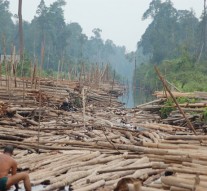
Why the EU Care About Illegal Logging in Indonesia?
Energy 2 May 2016The first ever Forest Law Enforcement, Governance and Trade (FLEGT) licensing scheme on legally produced tropical timber almost ready to begin between EU and Indonesia.
Last week, Indonesian President Joko Widodo, European Commission President Jean-Claude Juncker, and European Council President Donald Tusk agreed to establish the first-ever Forest Law Enforcement, Governance and Trade (FLEGT) licensing scheme. Its aim is to reduce illegal logging and to foster trade in legally produced timber between the EU and Indonesia.
“Indonesia and its partners in the EU have shown that trade can provide incentives towards ending the scourge of illegal logging. Such practices cost developing nations billions in lost revenues, lead to destruction of unique ecosystems and exacerbate poverty,” said Karmenu Vella, European Commissioner for Environment, Maritime Affairs and Fisheries.
The announcement follows the joint assessment of Indonesia’s readiness to implement the Indonesia-EU Voluntary Partnership Agreement (VPA). After this achievement, both Parties are now able to quickly reach a fully operational licensing system, as so to make Indonesia the first country to pass this last obstacle.
“Today’s announcement is a signal to markets that it is possible to promote sustainable forest management by buying verified legally produced timber,” she added.
What are the Indonesia-EU Voluntary partnership and the Forest Law Enforcement, Governance and Trade Action Plan?
The Indonesia-EU Voluntary Partnership Agreement (VPA) is a legally binding trade agreement, aimed to ensure that the EU market will receive exclusively legal timber and timber products from Indonesia.
The EU-Indonesia VPA is just one of 15 agreements that the EU is negotiating or implementing with timber producing countries in South East Asia and Africa. All in all, 24% of the world’s tropical forests are found in these countries, which supply 80% of the EU’s tropical timber imports.
A VPA partner country that has implemented a timber legality assurance system and other VPA commitments can issue verified legal timber products with FLEGT licences.
The Forest Law Enforcement, Governance and Trade (FLEGT) Action Plan is the EU’s response to the problem of illegal logging.
Adopted by the European Commission to address the issue at EU level, the plan aims to prevent illegal timber products from entering the EU market. The EU buys 11%, by value, of timber products and paper exported from Indonesia. Indonesia supplies 33% of the EU’s tropical timber imports by value.
The legality of timber and timber products must be assessed through a control system before issuing a FLEGT-license.
Supported significantly by the European Commission and EU Member States, such as the UK, the FLEGT VPA has increased transparency, accountability and stakeholder participation in decisions about forests in Indonesia.
Besides strengthening forest governance, it has also promoted legal trade, modernised and formalised Indonesia’s forest sector, as well as improved business practices. By doing so, it made possible for many thousands of businesses to meet market demand for legal timber.
Just 20% of Indonesia’s timber was legal in 2002, while today over 90% of Indonesia’s timber exports are from independently audited factories and forests. More than 20 million hectares of forests and more than 1700 forest industries are covered by these audits, an unprecedented level of scrutiny.
Why is the full implementation of the VPA significant?
“For the first time, timber consumers, suppliers, civil society and NGOs and governments across the world have come together to forge a trade deal that will conserve forests crucial to avoiding catastrophic climate change,” commented Aida Greenbury, Managing Director of Sustainability for Asia Pulp & Paper Group (APP), one of the largest pulp and paper producers in the world.
She also added that: “this regulatory breakthrough is extremely timely and responds to a gap in the global trade system that has become more acute over the last decade.”
During the last ten years, Indonesia’s timber-based products have increased significantly into the EU market. Indonesian timber-based exports to the EU were valued at US $645 million in 2014 – a 9% increase on the year before.
However, the impact of illegal logging has been having a profound effect, as highlighted by report issued by Indonesia’s anti-corruption commission. According to the report, 629 million cubic meters of timber vanished on the black market between 2003 and 2014. This has caused the Indonesian Government to lose billions in tax revenue.
Such illegal business does not just negatively affect the environment by increasing CO2 emissions and enhancing global warning. It also denies livelihoods to communities, breeds wider criminality and deprives crucial tax receipts of local and national government.
“The VPA’s full implementation is a huge chance and a tribute to the work of industry, policymakers and NGOs in Indonesia and in Europe. We now need to continue this race to the top, pioneering new standards that deliver the best outcomes for our business, our customers, our environment and our people,” Greenbury concluded.



